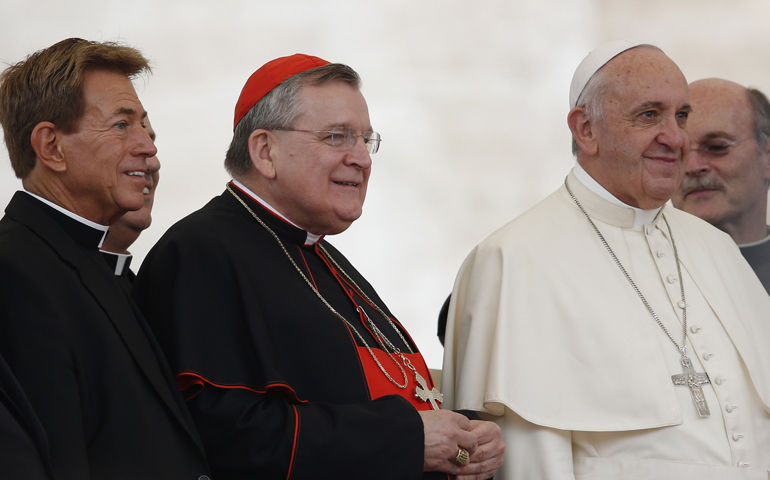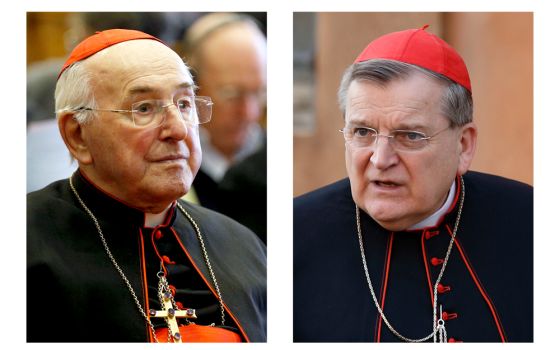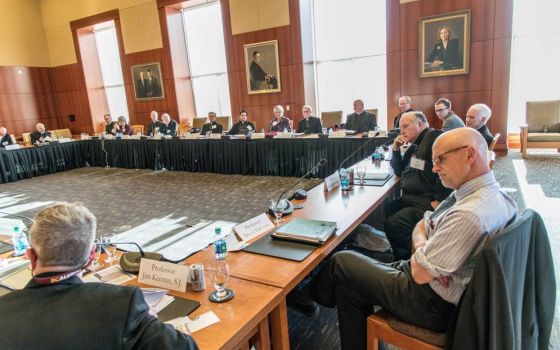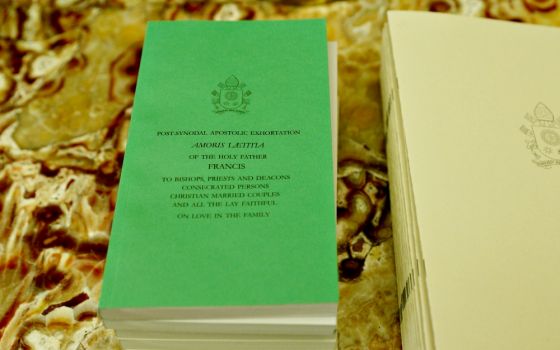
U.S. Cardinal Raymond Burke, center left, and a group of priests pose with Pope Francis during his general audience in St. Peter's Square at the Vatican Sept. 2. (CNS/Paul Haring)
True fact: if you lock four professors in a room they'll emerge with five opinions.
Oddly enough, four cardinals read Pope Francis' apostolic exhortation, Amoris Laetitia, and came out with a single opinion, and a letter.
To the pope.
OK, not a letter. It was a dubium, which is Latin for "you are wrong." The deeper meaning is "we are right."
It's the Communion wars all over again. Now it's about divorced and remarried folks who haven't gotten annulments of their prior marriages.
Following the second session of the Synod of Bishops on the family, the pope wrote 264 pages on "The Joy of Love," including this:
Because of forms of conditioning and mitigating factors, it is possible that in an objective situation of sin – which may not be subjectively culpable, or fully such – a person can be living in God's grace, can love and can also grow in the life of grace and charity, while receiving the Church's help to this end.(351)
That means someone in an "objective situation of sin" — a non-church marriage — may not be "subjectively culpable" — not exactly guilty due to mitigating circumstances. And the church can and should help.
There you have it. The pope — and the synod — called for pastoral wisdom and kindness toward folks divorced and remarried without benefit of annulments.
It is official church teaching — the result of the two-year synodal process — that pastors use both their heads and their hearts in guiding people in "irregular" marital situations. They are supposed to display mercy.
But then there is Footnote 351. The footnote includes earlier comments from Francis:
In certain cases, this [the church's help] can include the help of the sacraments. Hence, "I want to remind priests that the confessional must not be a torture chamber, but rather an encounter with the Lord's mercy" (Apostolic Exhortation Evangelii Gaudium [24 November 2013], 44: AAS105 [2013], 1038). I would also point out that the Eucharist "is not a prize for the perfect, but a powerful medicine and nourishment for the weak" (ibid., 47: 1039)
There he goes again. It's right there in black and white. The pope thinks the job of the church is mercy.
Some folks seem to object. A few canon lawyers are waving their law books, sputtering like motorboats, about all that. The naysayers are especially fond of Canon 915 — their ever-popular canon that denies Eucharist to people who "obstinately persevere in manifest grave sin."
Just to be clear: Footnote 351 does not say: "let him leave the mother of his children for a trophy wife." Nor does it say, "let her find another man."
What Footnote 351 says is: every individual has a story. Every individual's story has its causes, and some causes are more complicated than others.
The person whose spouse disappeared years ago has no way of obtaining an annulment. The person whose life and history were destroyed by war or earthquake cannot prove a case for annulment. The couple with children, now wed civilly for 25 years, may have made mistakes when they were very young.
They all may privately judge their prior marriages null. In many cases, they had good reason to leave their first marriage: their partners refused to have children, or were infected with drugs or alcohol, or were physically and verbally abusive, or refused to support them, or refused marital love, or were psychologically unstable, or were psychologically immature.
Sometimes a do-it-yourself annulment is the best folks can manage.
I know the paperwork nightmare of annulment procedures. I have helped friends navigate the shoals of diocesan tribunals. Sometimes things are easy. The paperwork falls into place or an administrative decision appears — a form wasn't filed in the first place. But sometimes things are hard. He lives in another country. She will not answer a letter.
It can take a lot of time. It used to take a lot of money.
Unfortunately, the four cardinals — three retired and one sidelined — want to throw the Code of Canon Law at all these people and, apparently, at Pope Francis.
The pope is having none of it.
The teams are lining up. The dean of the Roman Rota — the head of the Vatican's court of appeals — says if the four cardinals don't like Francis' teachings they should turn in their red birettas. Francis already removed the youngest of the complaining cardinals, 68-year-old Raymond Burke, as head of the Apostolic Signatura in November 2014. Burke, a canonical strict constructionist, is known for his fondness for the cappa magna. The others — Walter Brandmüller, 87, Carlo Caffarra, 78, and Joachim Meisner, 82 — are well retired.
Will the fights go on? Probably. Will the pope win?
It's not about the pope.
It's about the people of God. They are the winners.
[Phyllis Zagano is senior research associate-in-residence at Hofstra University in Hempstead, N.Y. Her most recent books include The Light of the World: Daily Meditations for Advent and Christmas, Women Deacons?: Essays with Answers and In the Image of Christ: Essays on Being Catholic and Female.]
Editor's note: We can send you an email alert every time Phyllis Zagano's column, Just Catholic, is posted. Go to this page and follow directions: Email alert sign-up.




